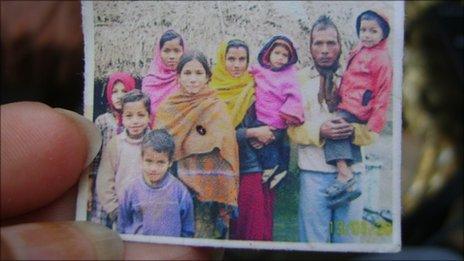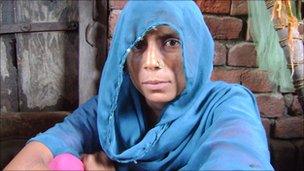Anger and grief over India murders
- Published

The murder of Sonam (in the orange shawl) has shocked India
Many victims of recent rapes in the northern Indian state of Uttar Pradesh were young girls. The BBC's Geeta Pandey meets the families of two girls who were assaulted and murdered.
SONAM, 14, KILLED ON 10 JUNE
When Tarannum sent her 14-year-old daughter Sonam to look for the family's buffalo calf, she didn't know that Sonam would never return home.
"At noon, the cattle came back, but there was no sign of Sonam. So I went looking for her."
For the next couple of hours, Tarannum walked the narrow lanes of Nighasan village - 150km (100 miles) from the state capital, Lucknow - calling out Sonam's name and asking the neighbours if they had seen the girl.
Her search ended at the police station, right in front of her house.
"I stood on a platform near the police station so I could look over the boundary wall. There I saw her kneeling on the ground, with her scarf tied around her neck. And it looked like she was hanging from a tree."
Attracted by her shrieks, several villagers came running, but no-one had the courage to enter the police station. "But I couldn't hold myself back: I had to go in, it was my daughter," says Tarannum, wiping her tears with her sari.
"As soon as I touched her, she tumbled over. She was cold, her eyes were wide open, her teeth gritted. I started screaming and the policemen came out of their quarters. I told them: 'Sir, look, what has happened to my daughter'."
The policemen, she says, abused her: "They called me names. They said take the body and go away. Otherwise, they said, they would throw us out."
After protests by villagers, the police registered a case several hours later. At first, they tried to pass it off as a case of suicide and the first post-mortem report ruled out rape or murder.
Following days of protests, the government ordered a second post-mortem which confirmed the murder.
All 11 policemen, including the officer in charge of the police station, were suspended hours after the crime. The superintendent of police of the district was also suspended.
Two policemen were later arrested - one is charged with murder while the other is accused of destruction of evidence.
According to her family, Sonam was also raped. Tarannum cleaned her body and says she found semen in her daughter's vagina. The authorities also now say one of the arrested policemen has admitted attempting to rape Sonam.
Shock waves
Her killing has sent shock waves through India with many calling for strict action against the policemen involved.
"The police exist for the public, they are paid out of the public money. But absolutely nothing is done to make the policemen fear. And in cases where they are the accused, those cases will linger on forever in court," says Roop Rekha Verma of Sajhi Duniya, a group that works with women.
The police, however, say they do not tolerate members of the force who break the law.
Senior police officer GP Sharma says: "There may be a few policemen, like in any organisation, who are delinquents, who are deviants, who may at times break the law. You cannot wish it away, no matter how hard you try.
"But we take cognisance of such cases, we register cases against them, and also take departmental action against them."
The family say they are living in fear.
"We feel very insecure. I work as a day labourer, and if I don't go out to work, we'll all die of hunger," says Sonam's father Intizam Ali. "But I'm scared to leave my family. We've made enemies of the police and they may try to kill us to erase the proof."
Tarannum says: "We want an inquiry by the CBI [India's federal investigating agency], we want security, we want an identification parade of the policemen, I will identify the guilty.
"And then he should be handcuffed and paraded in the village. Then only will I feel peace. I don't just want him punished in court. Who's going to see it there? He killed my daughter here; everyone here must see him humiliated."
SALIA, 11, RAPED AND KILLED ON 20 JUNE

Salia's mother Fatima is inconsolable
On 20 June, Salia, 11, left school as usual to walk home with her younger brother Meraj and several other children.
Home was a short distance, just a kilometre (half a mile). As the children began walking, it started to rain.
Salia took shelter under a tree - she said she didn't want to get wet - but the others continued walking.
When she didn't return home for several hours, her family mounted a search.
A few hours later, her body was found in a sugarcane field. Neighbours remember Salia as a friendly and well-behaved child who loved mangoes and jamun (black plums).
"She was in a real bad shape, there was blood oozing out of her eyes, her nostrils, her ears, she was bleeding everywhere," says her mother, Fatima, tears rolling down her cheeks.
'A mistake'
"I heard about a body in the sugarcane field. I had no idea it was my daughter's. I went along with everyone else. And then I saw that it was her," says her father, Sarfuddin.
"Her face was so badly mutilated that I couldn't recognise her. I identified her from her clothes. Then I started to shout and cry that it was my daughter. She was dead by then."
The next day, police arrested 23-year-old Manoj Kumar, a neighbour, who confessed to raping and killing the child.
"He said he dragged Salia to his field. He said he couldn't untie her salwar pyjama, so he ripped it off. He said he raped her, then he strangled her with her own scarf," Fatima says.
"He said he had 'made a mistake'. He said it three times. I don't know why he did it. We had no fight with him; there was no enmity," she says.
Police say the crime was committed on the spur of the moment. The attacker was a low-caste Dalit (formerly untouchable) man, and his victim a poor Muslim.
Stunned villagers say it is the first such crime in the village of Ganuapur, 130km (80 miles) from Lucknow.
When I visited Ganuapur, it was raining heavily. "Just like the day my daughter was killed," said Sarfuddin.
I ask him if he had a photo of Salia, described as "very pretty" by the villagers.
Sarfuddin shakes his head. "We never had a picture taken. We never even thought about it."
One moment he is angry, demanding the death penalty for the "criminal who killed my Salia".
The next, he is completely distraught: "It was written in my destiny, that's why it happened. I wish he had killed me instead."
- Published18 July 2011
- Published21 June 2011
- Published20 June 2011
- Published13 June 2011